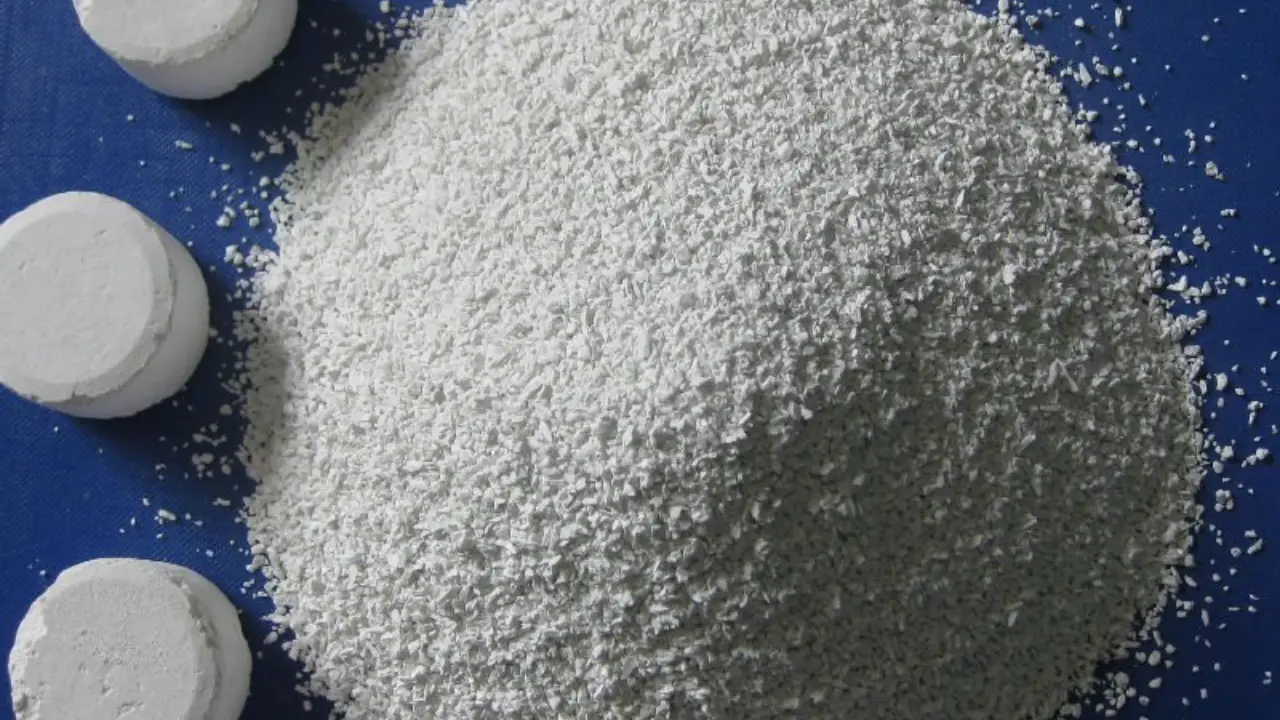Supplier of Calcium Hypochlorite from Turkey and Dubai UAE

- Calcium Hypochlorite Overview
- What Is Calcium Hypochlorite?
- Key Properties of Calcium Hypochlorite
- Production Process of Calcium Hypochlorite
- Types and Grades of Calcium Hypochlorite
- Applications and Uses of Calcium Hypochlorite
- Benefits of Using Calcium Hypochlorite
- Handling, Storage, and Safety Guidelines
- Packing and Container Loading
- Technical Data Sheets of Calcium Hypochlorite
Calcium Hypochlorite Overview
Calcium hypochlorite (Ca(ClO)₂) is a premier disinfectant and bleaching agent, distinguished by its high available chlorine content (typically 65–70%), potent oxidizing capabilities, and extended disinfection performance. It serves a vital function in critical applications such as water treatment, swimming pool sanitation, industrial cleaning, and agricultural hygiene.
What Is Calcium Hypochlorite?
Calcium hypochlorite is an inorganic compound that presents as a white or grayish solid. When dissolved in water, it readily releases chlorine to form hypochlorous acid (HOCl), a powerful antimicrobial agent highly effective at neutralizing bacteria, viruses, and algae. Its proven efficacy and stability have established it as a leading choice for drinking water disinfection, swimming pool maintenance, and industrial sanitation.
Available in multiple grades and formulations, calcium hypochlorite is globally recognized for its optimal balance of efficiency, safety, and cost-effectiveness, making it one of the most trusted chlorine-based compounds in the world.
Key Properties of Calcium Hypochlorite
| Chemical Formula | Ca(ClO)₂ |
| Appearance | White or grayish granules, powder, or tablets |
| Chlorine Content | 65–70% (Standard Grade) |
| Solubility | 21 g/100 mL in water |
| pH (1% Solution) | 11–12 (mildly alkaline) |
| Odor | Characteristic chlorine scent |
| Oxidizing Ability | High, ensuring effective bleaching and disinfection |
| Column 1 Value 7 | Column 2 Value 7 |
These properties ensure consistent and reliable performance across a diverse range of industrial and commercial applications.
Production Process of Calcium Hypochlorite
Calcium hypochlorite is synthesized through a meticulously controlled chemical reaction involving chlorine gas and calcium hydroxide:
2Cl₂ + 2Ca(OH)₂ → Ca(ClO)₂ + CaCl₂ + 2H₂O
This manufacturing process is optimized to guarantee a high chlorine yield and stable compound formation. The result is a premium product suitable for demanding industrial, agricultural, and domestic disinfection protocols.
Types and Grades of Calcium Hypochlorite
Calcium hypochlorite is manufactured in different grades to meet specific industry requirements for purity, stability, and chlorine concentration. The two primary grades available are distinguished by their chlorine content:
High-Strength Grade (65-70%)
This is the most common and versatile grade, valued for its high concentration of available chlorine.
- Applications: Ideal for large-scale applications such as municipal water treatment, commercial swimming pools, and industrial sanitation, where maximum disinfecting power is required.
- Benefits: Its high potency allows for lower dosage rates, making it a cost-effective solution for achieving reliable disinfection. It is the standard for drinking water purification and heavy-duty cleaning.
Medium-Strength Grade (40-60%)
This grade contains a lower concentration of active chlorine and is often blended with other stabilizers or agents.
- Applications: Suited for less demanding applications, including residential pools, smaller-scale wastewater treatment, and certain agricultural hygiene tasks.
- Benefits: It is often more economical and can be easier to handle for users who do not require the maximum chlorine concentration. This grade provides a balance between performance and budget for specific, non-critical uses.
The selection between grades depends on the specific application, required disinfection efficacy, and operational budget.
Applications and Uses of Calcium Hypochlorite
1. Water Treatment and Purification
As a primary disinfectant for drinking water, municipal systems, and swimming pools, calcium hypochlorite releases hypochlorous acid to effectively eradicate bacteria and viruses. It is often utilized in conjunction with soda ash to manage pH levels and optimize chlorine efficiency, ensuring pristine and safe water for both residential and industrial systems.
2. Industrial and Domestic Disinfection
Hospitals, food processing facilities, and households rely on calcium hypochlorite to sanitize surfaces, equipment, and wastewater. In industrial cleaning formulations, it is frequently paired with caustic soda to break down organic residues and amplify disinfection performance.
3. Bleaching Agent
Its potent oxidizing properties make it an indispensable agent in the textile, paper, and detergent manufacturing industries. Within detergent production, calcium hypochlorite works synergistically with Linear Alkyl Benzene (LAB) to improve stain removal, enhance brightness, and ensure product stability.
4. Agriculture
The agricultural sector employs calcium hypochlorite to disinfect irrigation systems, animal drinking water, and farm equipment, thereby promoting healthier environments for crops and livestock.
5. Food and Beverage Industry
This compound is crucial for maintaining hygienic processing environments by disinfecting food contact surfaces, bottling lines, and water systems used in beverage production.
6. Wastewater Treatment
Wastewater treatment plants use calcium hypochlorite to neutralize pathogens, oxidize organic matter, and uphold overall sanitation efficiency.
Benefits of Using Calcium Hypochlorite
- Powerful Disinfection: Effectively eliminates a broad spectrum of pathogens, including bacteria, viruses, and fungi.
- Long Shelf Life: Exhibits excellent stability and durability when stored under proper conditions.
- Cost-Effective: Delivers a high concentration of available chlorine, maximizing value per dose.
- Versatile Applications: Suitable for a wide array of industries and environmental conditions.
- Reliable Supply: Consistently available in various grades and packaging configurations for global distribution.
Handling, Storage, and Safety Guidelines
As a strong oxidizing agent, calcium hypochlorite requires strict adherence to safety protocols:
- Storage: Store in a cool, dry, and well-ventilated area, isolated from moisture, acids, and flammable or organic materials.
- Handling: Always use appropriate personal protective equipment (PPE), including gloves, safety goggles, and respiratory masks. Prevent direct contact with skin and eyes.
- Disposal: Dispose of in accordance with all local, state, and federal environmental regulations. Never mix with incompatible materials.
A comprehensive Safety Data Sheet (SDS) is provided with every shipment to ensure regulatory compliance and user safety.
Packing and Container Loading
Calcium hypochlorite is offered in 25 kg and 45 kg plastic drums, 50 kg HDPE drums, or 1000 kg jumbo bags, customized to client specifications.
Container Loading Capacity:
- 20’ FCL: Approximately 19.8–20 metric tons
- 40’ FCL: Approximately 24 metric tons
All packaging is moisture-proof and labeled in compliance with international transport regulations to guarantee secure and reliable delivery.
Technical Data Sheets of Calcium Hypochlorite
| Physical & Chemical Properties | ISIRI Compliant Range | CCPC Product Range | Standard Reference |
|---|---|---|---|
| Active Chlorine_%W | Min 65 | Min 65 | ISIRI 7098 & 3352 |
| Sodium Chloride_ %W | Max 20 | Max 10 | ISIRI 7098 |
| Solubility as Active Chlorine%W | Min 45.5 | Min 50 | ISIRI 7098 |
| Insoluble in Water _%W | Max 8 | Max 8 | ISIRI 7098 |
| Amount of Water _%W | 2 – 8 | 2 – 8 | ISIRI 7098 |
| Residue on 425 Micrometer Sieve _%W | Min 75 | Min 75 | ISIRI 7098 & 3352 |
| Residue on 2 mm Sieve _%W | Max 20 | Max 20 | ISIRI 7098 & 3352 |
| Cd _mg/Kg of Active Chlorine | Max 10 | Nil | ISIRI 7098 |
| Pb _mg/Kg of Active Chlorine | Max 15 | Nil | ISIRI 7098 |
| Ni _mg/Kg of Active Chlorine | Max 10 | Max 8 | ISIRI 7098 |
| Cr _mg/Kg of Active Chlorine | Max 15 | Max 12 | ISIRI 7098 |
| As _mg/Kg of Active Chlorine | Max 10 | Max 5 | ISIRI 7098 |
| Hg _mg/Kg of Active Chlorine | Max 7 | Max 5 | ISIRI 7098 |
| Sb _mg/Kg of Active Chlorine | Max 15 | Max 15 | ISIRI 7098 |
| Se _mg/Kg of Active Chlorine | Max 20 | Max 10 | ISIRI 7098 |
| Fe _ %W | Max 0.5 | Max 0.15 | ISIRI 3352 |
| Appearance | White, Granulated | OK | ISIRI 7098 |


